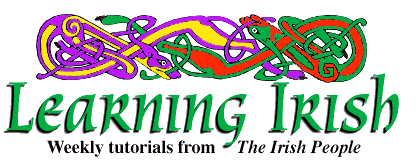
Irish Lesson 50
Pronunciation The groups "oigh" and "oidh", without a síneadh fada and at the beginning or middle of a word, sometimes takes an (eye) sound, as in the English word "bygone." Examples are: oighear (EYE-uhr), ice; foighne (FEYE-ne), patience; oidhreacht (EYE-rahk*t), heritage; oidhre (EYE-re), heir. At the end of a word, these groups often take an (OH-ee) sound, as in: ceannóidh (kan-OH-ee); imeoidh (im-YOH-ee).
Grammar With the verb "tá", the indirect speech forms for the future tense allow you to say sentences such as: He says that he will be here. Deir sé go mbeidh sé anseo. (der shay* goh me shay* un-SHUH). I think that John won't have the car. Is dóigh liom nach mbeidh an carr ag Seán. (is DOH-ee luhm nahk* me un kahr eg shaw*n). We think that she will be angry. Is dóigh linn go mbeidh fearg uirthi. (is D)H-ee lin goh me FAR-ruhg IR-ee).
In the case of regular verbs, the future is formed for the short verbs, such as "dún" (doon), close, in this way: dúnfaidh mé (DOON-hee may*), I shall close dúnfaidh too (DOON-hee too), you shall close dúnfaidh sé, sí (DOON-hee shay*, shee), he, she will close dúnfaimid (DOON-hi-mid), we shall close dúnfaidh sibh, siad (DOON-hee shiv, SHEE-uhd), you, they will close
The negative forms are: ní dhúnfaidh mé (nee GOON-hee may*), I won't close ní dhúnfaidh tú (nee GOON-hee too), you won't close ní dhúnfaidh sé, sí; he, she won't close ní dhúnfaimid (nee GOON-hi-mid), we won't close ní dhúnfaidh sibh, siad, you, they won't close Note that the word "ní" causes aspiration of the consonant starting the verb form.
To ask questions in the future tense:
An ndúnfaidh mé? (un NOON-hee may*), Shall I close? Etc. Nach ndúnfaidh mé? (nahk* NOON-hee may*), shan't I close? Etc. An ndúnfaimid? (un NOON-hi-mid), Will we close? Etc. Nach ndúnfaimid? (nahk* NOON-hi-mid), Won't we close? Etc. Here, the word "an" causes eclipsis of the consonant starting the verb form.
The letter"f" in the future form, although not pronounced as an "f", does cause a pronunciation change. There is a difference between "dúnaimid" (DOON-i-mid), we close, and "dúnfaimid" (DOON-hi-mid", we will close. Make sure that your pronunciation makes this clear.
The verbs with two syllables generally form the future in a slightly different way. They have an (oh) sound in the word to indicate the future tense. Here is the method: ceannoidh mé (kan-OH-ee may*), I shall buy ceannoidh tú (kan-OH-ee too), you will buy. Etc. ní cheannoidh mé (nee hyan-OH-ee may*), I shall not buy. Etc. an gceannoidh mé? (un gyan-OH-ee may*), shall I buy? Etc. ceannoimid (kan-OH-i-mid), we will buy. Etc. ní cheannoimid (nee hyan-OH-i-mid), we will not buy. Etc. an gceannoimid? (un gyan-OH-i-mid), will we buy? Etc.
Two-syllable verbs ending in -il, -ir, -is, and -in form the future similarly. For example: oscail becomes: osclóidh mé (oh-SKLOH-ee may*), I shall open imir becomes: imreoidh mé (im-ROH-ee may*), I shall play cosain becomes: cosnoidh mé (kuhs-NOH-ee may*), I shall defend inis becomes: inseoidh mé (in-SHOH-ee may*), I shall tell
The irregular verbs are less irregular in the future than in the past tense, but we will not start on them now. You will recognize "déanfaidh mé é" (DAY*N-hee may* ay*) immediately as "I shall do it", but some of the other irregular verbs are a bit more difficult to recognize in the future tense.
Drill We will do some recognition drilling for the future tense and other tenses in the next few weeks. Try these in Irish first: Bearrfaidh mé mé féin. Ólfaidh sé é. Ní ghlanfaidh mé é. Nach gcaillfidh sibh é? An gceapfaidh sí é sin? Nach gceannóidh tú rud eile? Fillfimid abhaile. Ní fhoghlaimeoidh sé go deo é. Críochnóimid an obair go luath. An ndiolfaidh tú é?
Key: BYAHR-hee may* may* fay*n. OHL-hee shay* ay*. nee GLUHN-hee may* ay*. nahk* GEYEL-hee shiv ay*? un GYAP-hee shee ay* shin? nahk* gyan-OH-ee too ruhd EL-e? FIL-hi-mid uh-VWAHL-e. nee ou-lim-OH-ee shay* goh dyoh ay*. kree-uhk*-NYOH-i-mid uh OH-bir guh LOO-uh. un NYEEL-hee too ay*?
Translation: I shall shave myself. He will drink it. I won't clean it. Won't you lose it? Will she think that? Won't you buy something else? We will return home. He won't ever learn it. We will finish the work soon. Will you sell it?
Finally, try these: Feicfidh mé é. Déanfaidh sé é. Cloisfimid an fear. Déarfaidh sé liom é. (They are for irregular verbs).
(c) 1998 The Irish People. May be reprinted with credit. |